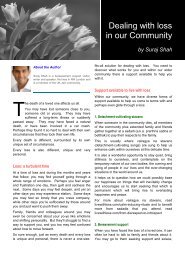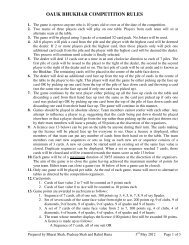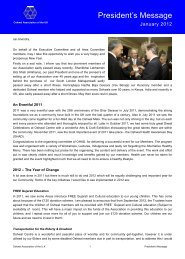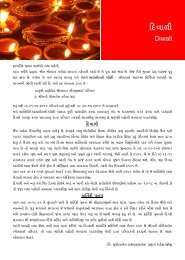OshwalNewsI - Oshwal Centre
OshwalNewsI - Oshwal Centre
OshwalNewsI - Oshwal Centre
You also want an ePaper? Increase the reach of your titles
YUMPU automatically turns print PDFs into web optimized ePapers that Google loves.
Happy Diwali - <strong>Oshwal</strong> News<br />
MAHAVIR’S COMPASSION<br />
Both violence and non-violence start by degrees. The<br />
beginnings are subtle and evolve quietly into grand acts of<br />
conflict or compassion. When Nelson Mandela was<br />
released, he was told by some to get even for the<br />
monumental wrong that was done to him - but he refused<br />
to be swayed by hatred. He said he had already been a<br />
physical prisoner of his opponents for long and did not<br />
wish to live the rest of his life as their emotional captive.<br />
Mr Mandela understood that to project anger outwards,<br />
one must burn internally and that to commit violence<br />
upon others, one must first turn violent upon the self.<br />
Burning the holder before its enemy, the fire of anger can<br />
consume the source before its adversary. Today, if we<br />
want to learn to conquer our baser emotions we need to<br />
learn from the examples of people like Nelson Mandela,<br />
Mahatma Gandhi and Martin Luther King, who forged<br />
their choices within the heart of life’s most tempestuous<br />
battles.<br />
The idea of ahimsa or non-violence is an emancipatory<br />
one. Yet it is not just a concept. It begins as a feeling and<br />
can grow into an all-encompassing life approach. The idea<br />
morphs into a feeling. It is this feeling that transforms<br />
others around us. Vardhman Mahavir’s life was an<br />
example of such self realisation. He inspired others in an<br />
exemplary fashion, imparting wisdom without preaching.<br />
In this manner, true understanding becomes possible. It<br />
has been said that an angry person opens his mouth and<br />
closes his eyes. It is our mind that needs control. Wars,<br />
they say, begin in the minds<br />
Mahavir’s<br />
compassion<br />
extended beyond<br />
humanity, to all<br />
forms of life.<br />
Mahavir speaks to<br />
us in the present.<br />
of men. So it there that<br />
peace must be won. Our<br />
sages understood this<br />
simple truth ages ago.<br />
Mahavir, practised the truth<br />
of ahimsa, peace and nonviolence<br />
without setting out<br />
to preach to the world.<br />
Mahavira understood the roots of<br />
violence in the human psyche. His<br />
warning therefore was against<br />
absolutism and dogmatism. His<br />
stress on Anekantvada was a plea<br />
for recognition of the multifaceted<br />
nature of reality. The<br />
perception of reality depends on<br />
the time, place, nature and state of<br />
the viewer. Absolute truth cannot<br />
result from any one viewpoint<br />
alone. Absolutism for him was an<br />
act of mental violence. Relativise<br />
the absolute, he pleaded. He<br />
wanted respect for different belief<br />
systems.<br />
Anekantvada is a vision within which the paradox of all<br />
opposites are integrated. If we look at things with balance<br />
we will know that opposites are complementary to each<br />
other. Without opposites there is no growth and<br />
awareness. When we are aware of the cycle of opposites<br />
we don’t see them as opposites. We see them as<br />
compatible for growth, allowing us to approach the world<br />
openly.<br />
Mahavir spoke against the mindless acquisitive impulse,<br />
and explained how this sets up the system of violence<br />
within our lives. He was not impractical or unrealistic. He<br />
wanted us to grow beyond of the self limiting principle of<br />
greed to enable us transcend our linearization. It is only<br />
the transcendence of the ego, that makes for a larger<br />
sympathy, an identification with a larger principle.<br />
Mahavir’s compassion extended beyond humanity, to all<br />
forms of life. His standpoint makes him a kindred spirit to<br />
contemporary environmentalists and animal<br />
conservationists. Mahavir speaks to us in the present. It is<br />
not by balance of terror or air-dropped bombs that we<br />
can make the world a safer place. We can make it a safer<br />
place with a transformed consciousness. For that<br />
transformation we need to heed the gentle and healing<br />
message of Mahavir.<br />
Source: Times of India<br />
Where does the Essence Lie<br />
Navkarmantra is the essence of Jain faith<br />
Equamimity is the essence of austerities and restraints<br />
Right character is essence of the renounced life<br />
Donation is the essence of wealth<br />
Discernment is the essence of human life<br />
Non - violence is the essence of religion<br />
Pleasure is the essence of devotion<br />
F<br />
51
















